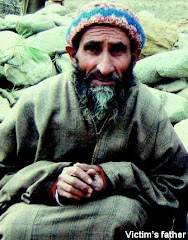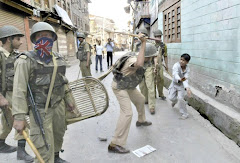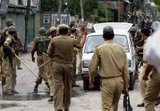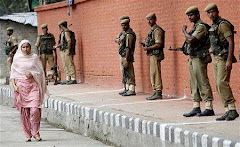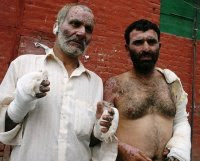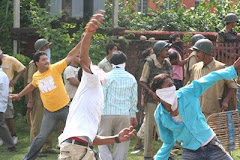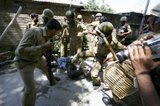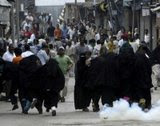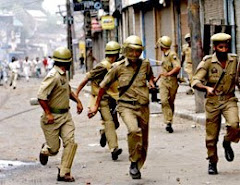It’s beyond doubt now, Hindutva's fascist ideology endangers India's secularism
Courtesy: Daily Greater Kashmir dt Nov. 23rd, 2008
DATELINE SRINAGAR BY ARJIMAND HUSSAIN TALIB
The big shroud of lies covering many bomb blast incidents in India, falsely implicating Kashmiri and Indian Muslims, looks disappearing. The last few days were particularly and shockingly interesting. India's premier investigating agency, CBI, on Nov 12 told a Delhi Court that two Kashmiri youth arrested from Delhi in Feb 2006 by Delhi Police, falsely implicating them for carrying out bomb blasts in the capital, were innocent. It also sought action against the three police officials involved in their illegal detention. On the other hand, the 22 Muslim youth who were under detention for their suspected involvement in Hyderabad blasts were released last week. They were among 70 others who had been picked up by the Hyderabad Police investigating the Makkah Masjid blast that killed nine people on May 18 and the Lumbini Park and Gokul Chat house blasts that killed 42 people on August 26 last year. Ironically, all these youth had been even charged with 'connections with SIMI'.As the Hindutva hand behind the gruesome bomb blasts at Malegoan, Ajmer Sharief, Hyderabad and on Samjhauta Express stands exposed, some very disturbing questions arise: what about many other such incidents? Who carried them out? Our memory must not fail us in recollecting all the fire-talk that parties like the BJP would do after such incidents. The way Hindutva parties like the BJP had made "incidents" like these and Muslim and Kashmir bashing staple fodder for their narrow political goals today stares at their faces. The Congress Party cannot be absolved of the blame either. At the heart of India's establishment and the indirect recipient of profound intelligence reports, it is impossible that the Congress leadership was unaware of the truth. What the Congress seems to be doing today is cashing on a reality for the forthcoming elections which it was already aware of. That certain Hindu extremist groups were involved in terrorist activities is nothing new. That these groups harbour certain fascist ideologies which can be termed as simply catastrophic is also nothing novel.Beyond all the cynical politicking, what is shocking is the level of involvement of diverse political and religious figures of India in the exposed Hindutva terror network. What is also ominous is the manner these extremist groups were using terrorist acts in creating a situation of mayhem and chaos – something which could only fuel a catastrophic backlash against the Muslims in India and Kashmir. Newspapers in India have revealed that many leaders of mainstream Hindutva parties were aware of the activities of the terrorist network working under the banners of Abhinav Bharat and Jammu-based Kalyan Trust. There are reports which suggest that this terrorist network includes many more people, and is not confined to people like Mahant Dayanand Panday, Lt Col Prasad Purohit and sadhvi Pragya Singh. A news report in the Times of India on Nov 16 provides some interesting insights into other details of this terror network.When Prime Minister, Manmohan Singh offers BJP leader, L K Advani, to share details of the activities carried out by this Hindu extremist network in private, it means many details are simply beyond public consumption. It looks what is being made public is just a tip of the iceberg. Times of India in a report on its front page on Nov 16 quoted one of the accused as saying that "leaders of the mainstream Hindutva groups were aware of their activities." The most worrisome is this terror group's aborted plan to kill 'a prominent Hindu leader of Delhi', as detailed in a Times of India report "Delhi-based Hindu leader in terror crosshairs, says ATS." This extremist group's Jammu connections and the involvement of some figures who have wielded power and clout in the State's establishment are highly worrisome. Lt Col Purohit, according to newspaper reports, has already trained at least 500 Hindu youth in carrying out subversive activities, many of them from Jammu. Sixty kgs of deadly RDX explosive was obtained by Lt Col Purohit from J&K in 2006 alone. Indian Express on Nov 13 has revealed that Maharashtra Anti Terrorism Squad (ATS) has acquired details about Mahant Amritanand alias Dayanand Pandey connections in Jammu. It is curious the manner he was able to register a trust namely Kashyapmeru Shankaracharya Amritanand Vedic Vishva Kalyan Trust using a Jammu-based chartered accountant V K Kapoor's residential address as the address of the trust. V K Kapoor was quoted by Indian Express as saying that he came in contact with the Mahant some years ago at the residence of former BJP MLA, Rishi Kumar Koushal - who incidentally happens to be the founder of the Jammu Praja Parishad. Certain reports in India's national newspapers looking at the establishment of the Sharda Sarvagya Peeth in Jammu and its funding also point towards the need for in-depth investigations. That Mahant Dayanand Pandey after coming to Jammu changed his name and even got away with that puts a lot of light on how J&K's security apparatus works with a one-eyed approach. What is disturbing is that the accused Mahant had even shared the dais with the Amarnath Sangharsh Samiti in Jammu, providing crucial support to the Amarnath 'movement' this year. The Mahant has been networking with the Hindutva groups and even sections of J&K's bureaucracy and establishment, actively campaigning for the trifurcation of Jammu and Kashmir into three regions, Jammu, Kashmir and Ladakh - a very Hindutva idea. And yet the State's security apparatus has been doing nothing.Although members of the Sangharsh Samiti today are dissociating themselves from the subversive activities of the Mahant, it is unlikely that there was an absolute innocence in Jammu's Hindutva circles about the activities of his group. Indian Express on Nov 13 in a front page piece gave astonishing details about the Mahant's links and connections quoting the website www.sarvagyapeeth.com. It revealed that Hindutva ideologue, Veer Savarkar's daughter-in-law, Himani Savarkar, at the launching of Abhinav Bharat, lauded the role of the Mahant in his work for the 'Hindu cause'. The figures of the trust include people like former ABVP national executive member, Pragya. The Mahant in the same website counts a host of political leaders ranging from BJP General Secretary, K.N Govindacharya, to present Congress Working Committee member, M.L Fotedar, as 'advisors'. It is well known that certain groups within the Hindutva fold have espoused the lofty goal of Akhand Bharat, which runs counter to India's constitutional commitment to secularism. It is also well known that these groups have always been interested in the Nazi Party's tactics in provoking a holocaust against the Jews. If this Hindutva network's these subversive acts point to imitation of the Nazi Party's tactics of creating conditions of a catastrophic backlash against India's Muslims, then surely it is a time for the Indian state to act. And act tough. Looking at the level of involvement in this terror network, India's secularism stands at test. For the larger good of the concept of India as a secular country, this brand of Hindutva espousing fascism needs to be defeated. Feedback at arjimand@gmail.com
The big shroud of lies covering many bomb blast incidents in India, falsely implicating Kashmiri and Indian Muslims, looks disappearing. The last few days were particularly and shockingly interesting. India's premier investigating agency, CBI, on Nov 12 told a Delhi Court that two Kashmiri youth arrested from Delhi in Feb 2006 by Delhi Police, falsely implicating them for carrying out bomb blasts in the capital, were innocent. It also sought action against the three police officials involved in their illegal detention. On the other hand, the 22 Muslim youth who were under detention for their suspected involvement in Hyderabad blasts were released last week. They were among 70 others who had been picked up by the Hyderabad Police investigating the Makkah Masjid blast that killed nine people on May 18 and the Lumbini Park and Gokul Chat house blasts that killed 42 people on August 26 last year. Ironically, all these youth had been even charged with 'connections with SIMI'.As the Hindutva hand behind the gruesome bomb blasts at Malegoan, Ajmer Sharief, Hyderabad and on Samjhauta Express stands exposed, some very disturbing questions arise: what about many other such incidents? Who carried them out? Our memory must not fail us in recollecting all the fire-talk that parties like the BJP would do after such incidents. The way Hindutva parties like the BJP had made "incidents" like these and Muslim and Kashmir bashing staple fodder for their narrow political goals today stares at their faces. The Congress Party cannot be absolved of the blame either. At the heart of India's establishment and the indirect recipient of profound intelligence reports, it is impossible that the Congress leadership was unaware of the truth. What the Congress seems to be doing today is cashing on a reality for the forthcoming elections which it was already aware of. That certain Hindu extremist groups were involved in terrorist activities is nothing new. That these groups harbour certain fascist ideologies which can be termed as simply catastrophic is also nothing novel.Beyond all the cynical politicking, what is shocking is the level of involvement of diverse political and religious figures of India in the exposed Hindutva terror network. What is also ominous is the manner these extremist groups were using terrorist acts in creating a situation of mayhem and chaos – something which could only fuel a catastrophic backlash against the Muslims in India and Kashmir. Newspapers in India have revealed that many leaders of mainstream Hindutva parties were aware of the activities of the terrorist network working under the banners of Abhinav Bharat and Jammu-based Kalyan Trust. There are reports which suggest that this terrorist network includes many more people, and is not confined to people like Mahant Dayanand Panday, Lt Col Prasad Purohit and sadhvi Pragya Singh. A news report in the Times of India on Nov 16 provides some interesting insights into other details of this terror network.When Prime Minister, Manmohan Singh offers BJP leader, L K Advani, to share details of the activities carried out by this Hindu extremist network in private, it means many details are simply beyond public consumption. It looks what is being made public is just a tip of the iceberg. Times of India in a report on its front page on Nov 16 quoted one of the accused as saying that "leaders of the mainstream Hindutva groups were aware of their activities." The most worrisome is this terror group's aborted plan to kill 'a prominent Hindu leader of Delhi', as detailed in a Times of India report "Delhi-based Hindu leader in terror crosshairs, says ATS." This extremist group's Jammu connections and the involvement of some figures who have wielded power and clout in the State's establishment are highly worrisome. Lt Col Purohit, according to newspaper reports, has already trained at least 500 Hindu youth in carrying out subversive activities, many of them from Jammu. Sixty kgs of deadly RDX explosive was obtained by Lt Col Purohit from J&K in 2006 alone. Indian Express on Nov 13 has revealed that Maharashtra Anti Terrorism Squad (ATS) has acquired details about Mahant Amritanand alias Dayanand Pandey connections in Jammu. It is curious the manner he was able to register a trust namely Kashyapmeru Shankaracharya Amritanand Vedic Vishva Kalyan Trust using a Jammu-based chartered accountant V K Kapoor's residential address as the address of the trust. V K Kapoor was quoted by Indian Express as saying that he came in contact with the Mahant some years ago at the residence of former BJP MLA, Rishi Kumar Koushal - who incidentally happens to be the founder of the Jammu Praja Parishad. Certain reports in India's national newspapers looking at the establishment of the Sharda Sarvagya Peeth in Jammu and its funding also point towards the need for in-depth investigations. That Mahant Dayanand Pandey after coming to Jammu changed his name and even got away with that puts a lot of light on how J&K's security apparatus works with a one-eyed approach. What is disturbing is that the accused Mahant had even shared the dais with the Amarnath Sangharsh Samiti in Jammu, providing crucial support to the Amarnath 'movement' this year. The Mahant has been networking with the Hindutva groups and even sections of J&K's bureaucracy and establishment, actively campaigning for the trifurcation of Jammu and Kashmir into three regions, Jammu, Kashmir and Ladakh - a very Hindutva idea. And yet the State's security apparatus has been doing nothing.Although members of the Sangharsh Samiti today are dissociating themselves from the subversive activities of the Mahant, it is unlikely that there was an absolute innocence in Jammu's Hindutva circles about the activities of his group. Indian Express on Nov 13 in a front page piece gave astonishing details about the Mahant's links and connections quoting the website www.sarvagyapeeth.com. It revealed that Hindutva ideologue, Veer Savarkar's daughter-in-law, Himani Savarkar, at the launching of Abhinav Bharat, lauded the role of the Mahant in his work for the 'Hindu cause'. The figures of the trust include people like former ABVP national executive member, Pragya. The Mahant in the same website counts a host of political leaders ranging from BJP General Secretary, K.N Govindacharya, to present Congress Working Committee member, M.L Fotedar, as 'advisors'. It is well known that certain groups within the Hindutva fold have espoused the lofty goal of Akhand Bharat, which runs counter to India's constitutional commitment to secularism. It is also well known that these groups have always been interested in the Nazi Party's tactics in provoking a holocaust against the Jews. If this Hindutva network's these subversive acts point to imitation of the Nazi Party's tactics of creating conditions of a catastrophic backlash against India's Muslims, then surely it is a time for the Indian state to act. And act tough. Looking at the level of involvement in this terror network, India's secularism stands at test. For the larger good of the concept of India as a secular country, this brand of Hindutva espousing fascism needs to be defeated. Feedback at arjimand@gmail.com










